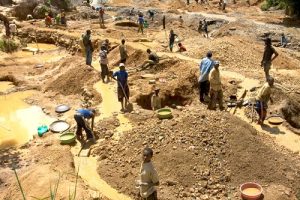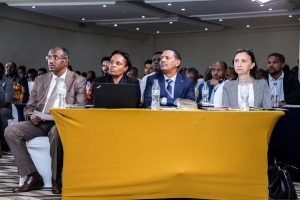BY DIRRIBA TESHOME
Climate change, biodiversity loss and pollution emergencies have counted many years threatening the existence of human kind in the future. These need to be undertaken together within the outline of the Sustainable Development Goals.
As a result, the United Nations Environment Program has published: “Making Peace with Nature: A scientific blueprint to tackle the climate, biodiversity and pollution emergencies” in February this year. It was co-funded by Norwegian Ministry of Climate and Environment, and the European Union to better create sound able global influence on the way out for the next generation.
Since the international communities are commonly endangering the nature, this article has focused on sensing the impact and the critical measures needed to be taken by the governments besides all human beings.
United Nations Secretary-General, António Guterres has critically viewed the impact of human being on the climate change, biodiversity loss and pollution emergencies as included in the blueprint.
He begins with: “Humanity is waging war on nature. This is senseless and suicidal; the consequences of our recklessness are already apparent in human suffering, towering economic losses and the accelerating erosion of life on Earth.
Ending our war does not mean surrendering hard-won development gains. Nor does it cancel the rightful aspiration of poorer nations and people to enjoy better living standards. On the contrary, making peace with nature, securing its health and building on the critical and undervalued benefits that it provides are keys to a prosperous and sustainable future for all.”
The pressing need to convert the relationship with nature is risks being disregarded amid the huge suffering inflicted by the COVID-19 pandemic, the Secretary General insists adding: “Saving precious lives and livelihoods is our top priority. But by exposing humanity’s vulnerability, the pandemic can also help make 2021 a turning point towards a more sustainable and inclusive world.”
By bringing together the latest scientific evidence showing the impacts and threats of the climate emergency, the biodiversity crisis and the pollution that kills millions of people every year, it makes clear that our war on nature has left the planet broken, he pronounced the pains. “But it also guides us to a safer place by providing a peace plan and a post-war rebuilding program,” he appreciated the report as it showcased solutions.
“By transforming how we view nature, we can recognize its true value. By reflecting this value in policies, plans and economic systems, we can channel investments into activities that restore nature and are rewarded for it.” He notes that the nature should be recognized as an indispensable ally and human ingenuity need to be unleashed in the service of sustainability and secure our own health and well-being alongside that of the planet.
Making peace with nature is the defining task of the coming decades, he notes it adding: “We must seize the opportunity presented by the COVID-19 crisis to accelerate change.
This year, several major international conferences, including on climate change, biodiversity and desertification, provide an opportunity to increase ambition and action on recovering better and addressing climate disruption.”
The central objective is to build a global coalition for carbon neutrality. If adopted by every country, city, financial institution and company around the world, the drive to reach net-zero emissions by 2050 can still avert the worst impacts of climate change, Guterres specified.
Similar urgency and ambition are needed to transform other systems, including how human beings produce food and manage water, land and oceans. Developing countries need more assistance to redress environmental decline. “Only then can we get back on track to achieve the Sustainable Development Goals by 2030.”
According to Guterres, the blueprint shows that human beings have the ability to transform its impact on the world. A sustainable economy driven by renewable energy and nature-based solutions will create new jobs, cleaner infrastructure and a resilient future.
An inclusive world at peace with nature can ensure that people enjoy better health and the full respect of their human rights so they can live with dignity on a healthy planet.
In the same manner, the United Nations Environment Program, Executive Director, Inger Andersen also demonstrates the impact of climate change, biodiversity loss and pollution emergencies in the peaceful existence of the globe as stated in the scientific blueprint.
Before the COVID-19 pandemic, 2020 was emerging as a moment of truth for our commitment to steer Earth and its people toward sustainability. “Momentum was building and global meetings were set to discuss bold action on the three interconnected planetary crises facing humanity, namely the climate crisis, the nature crisis and the pollution crisis.
These crises, driven by decades of relentless and unsustainable consumption and production, are amplifying deep inequalities and threatening our collective future.”
For Anderson, the blueprint makes the strongest scientific case yet for why and how that collective determination must be urgently applied to protecting and restoring our planet.
“Drawing on a unique and comprehensive synthesis of global environmental assessments, it details the self-defeating and dangerous consequences of our overconsumption of resources and overproduction of waste.
The science is clear that we are putting extreme pressures on the planet. Our colleagues at the Intergovernmental Science-Policy Platform on Biodiversity and Ecosystem Services (IPBES) have sounded the alarm on the rapid decline of nature and what this means for Agenda 2030 and the Sustainable Development Goals (SDG).”
As stated in the 2020 UNEP Emissions Gap Report, while the pandemic resulted in a temporary decline in greenhouse gas emissions, we are heading for at least a 3°C temperature rise this century.
Anderson further notes that loss of biodiversity and ecosystem integrity, together with climate change and pollution will undermine the efforts on 80 per cent of assessed SDG Targets, making it even more difficult to report progress on poverty reduction, hunger, health, water, cities and climate.
“We need to look no further than the global pandemic caused by COVID-19, a zoonotic disease, which is transmitted from animal to human, to know that the finely-tuned system of the natural world has been disrupted.
And, finally, the “toxic trail” of economic growth – pollution and waste, results every year in the premature deaths of millions of people across the world.”
While the response to the medical emergency of COVID-19 rightly preoccupies government budgets and political action, the response to this pandemic must ultimately accelerate the economic and social transformations needed to address the planetary emergency.
“As the UN Secretary-General noted in his State of Planet speech, “COVID recovery and our planet’s repair must be two sides of the same coin,” she obligated.
Additionally, Anderson notes that the new scientific report outlines what the “repair” of our planet entails, the transformative actions that can unleash human ingenuity and cooperation to secure livelihoods and well-being for all.
“Repair means solutions that recognize how our environmental, social and development challenges are interconnected. Repair means shifting our values and worldviews as well as our financial and economic systems. Repair means taking a whole-of-society approach. And repair means being fair and just,” she louds the required transformation.
UNEP’s Medium-Term Strategy (2022-2025) seeks to ensure the link between science, policy and decision-making remains stronger than ever, sustained by strong environmental governance and supported by economic policies that can be the foundation of a catalytic response to the challenges of climate change, biodiversity loss and pollution.
“In doing so, we support member states, working with partners, scientists, civil society and business to tackle the three interconnected crises so that we stabilize climate; live in harmony with nature and secure a pollution free planet,” Anderson noted considering science as a guiding light.
In general, the United Nations Environment Program, Executive Director, Inger Andersen imagines that 2021 must be remembered as: “The year we took it upon ourselves to ensure that the pandemic is remembered not only as a human tragedy, but as the moment when people reconsidered their priorities as individuals and societies and took to heart that safeguarding the health and well-being of current and future generations means safeguarding the health of our planet.”
And if the scientific guideline is implemented and humans stop the war on nature and instead focus on restoring the planet, there would be peaceful world to the future generation.
The Ethiopian Herald March 9/2021





